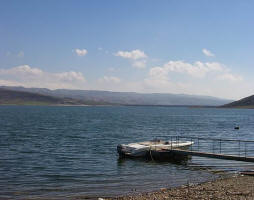 COROADO project: Recycled water makes a splash
COROADO project: Recycled water makes a splash
here water is scarce, it is particularly important to ensure that the precious drops aren't wasted. Recycling and reuse technologies can help to preserve this precious resource even in very arid regions. An EU-funded project has developed a decision support tool to help communities select the solutions that offer the best fit for their needs.
The web-based programme developed by the Coroado project supports decision-making processes by proposing tailor-made solutions to water management problems. It draws on a wide range of expertise in order to identify the best possible combination of water recycling and reuse technologies for a given region.
In addition to this know-how, the system takes account of the requirements and concerns of the various local stakeholders in order to find an acceptable solution for all involved. The development of this application and the community consultation process underpinning its use were informed by projects in four Latin American regions that are facing a variety of water management challenges.
Expertise on tap
“The decision support system is the core of Coroado,” says project coordinator Christos Karavitis of the Agricultural University of Athens. “Our objective was to develop user-friendly, web-based decision-making tools that provide an initial estimate of what technology might be suitable for a region.”
Suitability, in this context, is not just a matter of technology. A wide variety of considerations enter into the equation when it comes to finding the best technological fit for a specific geographical, cultural and economic environment.
“There are often far too many variables, even for a scientist or a specialist, and a decision-maker may not have this background or access to the required breadth of expertise,” Karavitis explains. “Our decision support tool incorporates this expert opinion and makes it available through an easily manageable user interface.”
It also enables the stakeholders involved in the process to express their criteria and concerns, and factors these in. “We would like this decision support system to be the arena of focused disagreement. So everybody inputs their objections there and can then see how they can be resolved in a step-by-step, concise, logical, creative and implementable way.”
Building bridges
This type of factual approach can help to identify possible solutions and address potential reticence. There are many water reuse and recycling technologies that can boost a region’s water supplies — some innovative, some less so. Not all of them are equal in the eye of the beholder. The concept of potable water reclaimed from sewage, for instance, is not met with the same enthusiasm by all.
Impressive as it is, providing this sophisticated system was only a first step for the project. Communities faced with water management issues also need guidance on its potential contribution to collective decision-making processes, and advice on the best ways to translate the outcomes into effective policies. Coroado is committed to providing this support.
As part of its research, the team is assisting communities in four Latin American regions. With another year to go on the project, this interaction is enabling the scientists to fine-tune their system and check its applicability under varying conditions.
More specifically, the study sites are located in Argentina, Brazil, Chile and Mexico, covering a variety of situations and constraints. The difficulties of managing resources in the essentially water-rich but densely populated Metropolitan Area of São Paulo, for example, differ from those of supporting life sustainably in the Atacama Desert.
The Coroado team’s help is extremely well received in all four regions, says Karavitis. “It is remarkable how people are embracing these solutions, and how committed they are to the idea that recycling and reuse can offer real solutions — not only with regard to practical issues, but also in terms of avoiding social pressures.”
While the project focuses on communities in Latin America, the system and methodology it developed are transposable, says Karavitis. They can help to develop the new, sustainable solutions that are urgently needed as populations grow, land use pressures build up and the climate changes.
“In the future, we will increasingly have to include circular recovery solutions,” Karavitis notes. Water management challenges can usually be met, he concludes, but we need to be prepared.
Project details:
- Project acronym: COROADO
- Participants: Greece (Coordinator) Netherlands, Portugal, Spain, Brazil, Cyprus, Chile, Norway, Switzerland, Mexico, Argentina
- Project reference 283025
- Total cost: € 4 584 166
- EU contribution: € 3 411 507
- Duration: October 2011 - September 2015
| Contact information |
Email: info@coroado-project.eu |
|---|---|
| News type | Inbrief |
| File link |
http://coroado-project.eu/dissemination/ |
| Source of information | EC DG Research and Innovation |
| Keyword(s) | recycled water |
| Subject(s) | ANALYSIS AND TESTS , CHARACTERISTICAL PARAMETERS OF WATERS AND SLUDGES , DRINKING WATER , DRINKING WATER AND SANITATION : COMMON PROCESSES OF PURIFICATION AND TREATMENT , ENERGY , HYDRAULICS - HYDROLOGY , INDUSTRY , INFRASTRUCTURES , MEASUREMENTS AND INSTRUMENTATION , METHTODOLOGY - STATISTICS - DECISION AID , PREVENTION AND NUISANCES POLLUTION , SANITATION -STRICT PURIFICATION PROCESSES , SLUDGES , WATER QUALITY |
| Relation | http://cordis.europa.eu/project/rcn/100578_en.html |
| Geographical coverage | n/a |
| News date | 13/04/2015 |
| Working language(s) | ENGLISH |
 you are not logged in
you are not logged in





